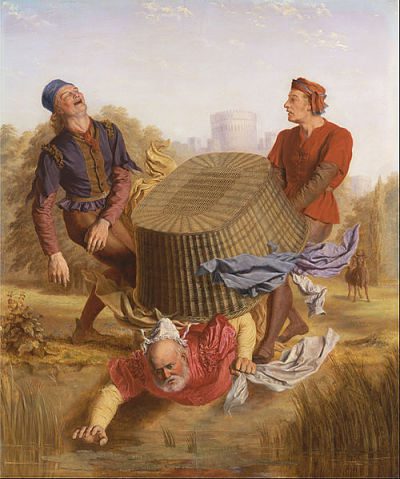
The wages of virtue is jollification.
This isn’t obvious, because we sometimes confuse not sinning with virtue. No manikin has ever sinned outside The Twilight Zone, but no dummy has virtue either. Goodness is beautiful and beauty is fun.
Obviously, a church whose symbol is a cross and who experiences martyrdom warns that things do not always turn out as they should before King Jesus comes. Still there is no piety in avoiding all levity. If Saint Paul never got tired of telling his friends to rejoice, we can do the same. Even Christian mourning, and there is a time to cry, is not without hope.
The other confusion comes because bad fun is so easy. Do what you want, get your way, and fun follows…for a time. Any fool can start a party with a six pack, he doesn’t even need friends, but joy that lasts…pranks that can be retold in polite company…and stories that are jolly without being juvenile require wit, timing, and virtue. Morality keeps the witty man, the holy prankster, from going too far and hurting the joke.
The Bible is never prudish, but also not crude. Too many of us only know “purity culture” or a Bacchanalia. Meanwhile the examples of centuries of Christian culture are forgotten along with the joyful pranking of the village wedding. As a boy, I heard numerous stories of friends and the shivaree…the tricks played on the groom during the honeymoon by his waggish pals.
Shakepeare walks the balance best of all Christian writers. Sex is worth a joke or five, but morality is reinforced in the banter. After all, nobody needed sex education in family quarters that were often one or two rooms! You could be private but not precious if you were the average Elizabethian.
Religious prudes kept trying to close theater. The mistake is obvious when you see how chaste the plays are to the degenerate modern. Shakespeare cannot satisfy the addict of vice because morality keeps triumphing. The greatest example of virtue combined with jolly fun is The Merry Wives of Windsor.
His audiences loved the character Sir John Falstaff, but they loved him for being a gross butt of the joke. The wages of sin is death, but first sin makes you ludicrous. Legend says his Queen asked to see Falstaff in love…not out of affection for his swinish vice, but because seeing an aging Clitonesque creep “love” was bound to be funny, because of course Falstaff is no more capable of love than of sex. The only sack where he performs adequately is a drink, not a bed.
The wise wives of Windsor refuse to be seduced by Sir John, but use the occasion for jokes not just sermons. Falstaff is left silly… though Shakespeare being Shakespeare meant that the wise women are stupid about the daughters. They want marriage for money or power…Miss Anne wants love as God and the church demand!
In any case, the wicked Falstaff is turned to good purpose: giving the town a chuckle while enforcing the bonds of marriage.
The play ends with the Godly couples stronger and sinners alone: highly realistic.
We face Falstaff characters in this time and we are tempted to jeremiads. Instead somebody should be waggish with Bill, Hill, and Don.
They are amusing…if nothing else and heaven help us be wags in our day.
———————————————————-
William Shakespeare went to God four hundred years ago. To recollect his death, I am writing a personal reflection on a few of his plays. The Winter’s Tale started things off, followed by As You Like It. Romeo and Juliet still matter, Lady Macbeth rebukes the lust for power, and Henry V is a hero. Richard II shows us not to presume on the grace of God or rebel against authority too easily. Coriolanus reminds us that our leaders need integrity and humility. Our life can be joyful if we realize that it is, at best, A Comedy of Errors. Hamlet needs to know himself better and talks to himself less. He is stuck with himself so he had better make his peace with God quickly and should stay far away from Ophelia. Shakespeare gets something wrong in Merchant of Venice . . . though not as badly as some in the English Labour Party or in my Twitter feed. Love if blind, but intellectualism is blind and impotent in Love’s Labours Lost. Brutus kills Caesar, but is overshadowed by him in Julius Caesar. We should learn not to make Much Ado about Nothing. We might all be Antony, but if we would avoid his fate then we must avoid flattery and the superficial love of Troilus and Cressida. We are fools, but our goal should be to accept it and not to degenerate into Biblical fools during our Midsummer Night’s Dream. Richard III is a symptom of a bad leadership community, but be careful that use Measure for Measure to guide your reaction to the mess. The modern university is Iago in Othello playing on our sins to destroy the nation. You can’t accumulate your way to a great leader and personal piety in Henry VI (Part I) is not enough to make a great king. God will save the King, not our stupid partisan squabbles seen in Henry VI (Part 2) and not kingmakers as existed in Henry VI (Part 3). Fortunately, in God’s world All’s Well That Ends Well. Two Gentlemen remind me that being in love is grand. King John keeps winning and so loses. Slander always gives way to truth in Cymbeline. We need patrons, but God help us if we flatter them and lose them as Athens did with Timon of Athens. We need good leaders and not have to hope against reason that one turns out well like young Prince Hal in Henry IV Part One. Being powerful is all fun and games, until it isn’t as Henry learns in Henry IV Part Two. Virtue can be jolly and edgy, as The Merry Wives of Windsor show.
















